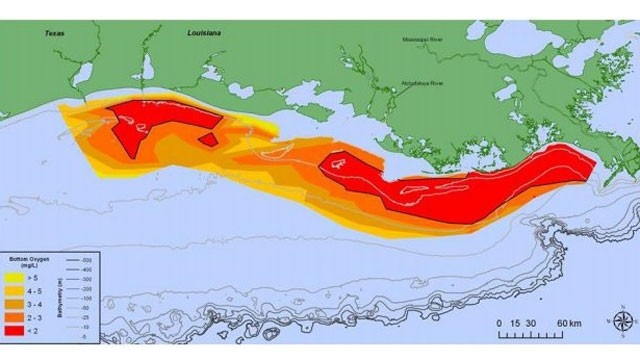The Gulf of Mexico has a “dead zone” the size of the state of Connecticut.
Scientists from the Environmental Protection Agency and the National Oceanic and Atmospheric Administration found an area of 5,052 square miles of “low oxygen water” or hypoxia in their annual survey.
The Gulf of Mexico dead zone is caused by nutrients that wash into the Gulf’s waters, which in turn boost the growth of algae blooms that suck up the oxygen.
These nutrients come from “human activities, such as agriculture and wastewater” according to NOAA and the U.S. Geological Survey. The nutrients end up in the Mississippi River which deposits them into the Gulf.
Scientists first discovered a dead zone in these waters in 1972. The patch varies in size from year to year.
This year’s dead zone was right in line with predictions and is smaller than the five-year average of 5,550 square miles. The survey was taken from July 27 to Saturday.
The Gulf of Mexico dead zone is the world’s second largest, according to Nancy Rabalais with the Louisiana Universities Marine Consortium.
“The number of dead zones throughout the world has been increasing in the last several decades and currently totals over 550,” Rabalais said of the growing problem.
Within the dead zone marine life struggles to find enough oxygen to survive.
Fish can migrate to other areas with more oxygen rich water, but it’s a different story for some of the other sea life.
Crabs, mussels and other crustaceans on the ocean floor can’t get out of the danger zone. The lack of oxygen causes them to die.
That amounts to an expensive hit for America’s fishing industry.
NOAA estimates the annual cost of algae blooms to U.S. seafood and tourism industries at $82 million or more.
This article was re-posted from click2houston.com – click here for original article.






